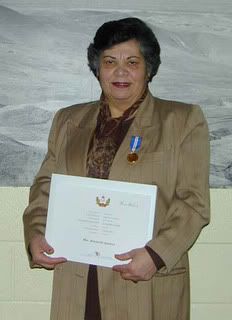
Nadia Tueini was a French-writing and published Lebanese poet, of Druz origin. She was married with Mr. Ghassan Tueini, founder, owner and editor of the two biggest Lebanese dailies, with massive distribution and influence in the Arab countries; Al-Nahar (=The Day) in Arabic, and L’Orient-Le Jour in French; Ex-Lebanese government minister, and Lebanon’s Ambassador at the United Nations, covering the period of the horrendous Lebanese Civil War.
I myself was the editor of the literary pages dedicated to the Arabic culture, of the Yeridassart Haiouhi (=Young Armenian Woman), the first feminist Armenian Monthly founded in the 30-ies by a prominent Armenian Francophile from Istanbul, Madame Siran Kupelian, known under her literary pseudonym Sehza, also its long-time editor.
As a journalist, I was well-connected with the local Arab literary circles.
I first met Nadia at the editorial offices of Al-Hasnaa (=The Beautiful One), a woman’s weekly in Arabic , owned by Mrs. Souad Najjar, and edited by Mrs. Sonia Beiruti, the well-known Lebanese journalist and TV broadcaster. Nadia and I struck up an instant friendship. I had gone there to interview Mrs. Najjar and Beiruti for my journal. I ended up interviewing Nadia...
Nadia was a remarkably intelligent woman, an enormously talented poet, and stunningly beautiful. I was therefore extremely distressed and absolutely devastated, when one day I met by chance her private nurse, an Armenian lady, who informed me of Nadia’s serious illness.
I met Nadia next at her husband’s plush offices at the Al-Nahar Daily. Ghassan Tueini greeted me warmly saying, “I know you have come not for me but for Nadia”, and had led me to her own office.
It was a joy to communicate with Nadia on every subject under the sun, while the political and social turmoil and chaos of the Middle East was raging during the Cold War.
Nadia was suffering truly personally for the lot of her fellow citizens. She was entirely dedicated to the ideals of Beauty in life, and human rights for all. We shared this together, for which reason our friendship grew an intense spiritual link.
Nadia was a leading light in the Baalbek Cultural Festival Committee; she inspired a series of programs of profound aesthetic and emotional experience by inviting world-class creative artists. Nadia told me that she wanted to always show the world that Lebanon was a country of great beauty and profound humanity, unfortunately to be shattered soon by a civil war caused by external political interference.
One night, after midnight in 1978, I received a surprise phone call from New York.
It was Nadia. With a trembling voice, she was asking for my news. Her distinguished husband was having a tough time at the United Nations, defending Lebanon from aggression, from all sides. Nadia burst into sobs. I was frightened for her well-being, and determined to calm her down. I pleaded with her not to upset herself, myself pretending that all was well with us in our beautiful country. I said, “Nadia, if there are still people like you and me and our husbands, Lebanon will never be defeated!”
Nadia concluded her conversation telling me, "Never ever want to live in America – because it is a bigger jungle than war-torn Lebanon."
In spite of the unendurable dangers during the horrors of the civil war, we never relented on our cultural programs – the reason for my frequent meetings with Nadia, after the Tueini-s returned from the United Nations. Unfortunately, the Lebanese civil war got worse and worse, more and more inhuman by the day. Mr. Ariel Sharon of Israel had seen to it that his Lebanese partners had genocided the Palestinians of the Sabra and Shatila Refugee camps.
On that same fateful day of that genocide, well into the midnight, I received a phone call from Beit-mary, where the Tueinis owned a mountain-retreat overlooking the capital city.
It was Nadia, hardly able to speak, in a hardly audible voice, mixed with uncontrollable sobbing.
She stammered, “Arsineh, what have we come to! Should the human race sink so very low? How can people behave so inhumanly in the natural beauty of our world, especially here in the Lebanon!"
I began sobbing myself. I said, “Nadia, I shall leave everything right now and come to you immediately – would you like me to?” She said, “No Arsineh, no – please stay where you are, with your family, the roads are very dangerous!"
When I insisted that I must absolutely go to her, Nadia repeated, “No Arsineh, you should not see me as I appear now.... I want you to remember me as I was when we first met...”
The only heart-felt, soulful satisfaction I felt was that our conversation had taken some time...
Little did I know that it would be the last time that I would hear Nadia’s voice!
It seems it was also her last telephone conversation ever.
Today, indeed I remember Nadia as a unique beauty, with a classical languid countenance that would make people want to love and adore her forever.

No comments:
Post a Comment